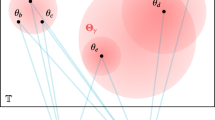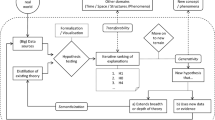Abstract
This expository paper on Aristotle’s prototype underlying logic is intended for a broad audience that includes non-specialists. It requires as background a discussion of Aristotle’s demonstrative logic. Demonstrative logic or apodictics is the study of demonstration as opposed to persuasion. It is the subject of Aristotle’s two-volume Analytics, as its first sentence says. Many of Aristotle’s examples are geometrical. A typical geometrical demonstration requires a theorem that is to be demonstrated, known premises from which the theorem is to be deduced, and a deductive logic by which the steps of the deduction proceed. Every demonstration produces (or confirms) knowledge of (the truth of) its conclusion for every person who comprehends the demonstration. Aristotle presented a general truth-and-consequence theory of demonstration meant to apply to all demonstrations: a demonstration is an extended argumentation that begins with premises known to be truths and that involves a chain of reasoning showing by deductively evident steps that its conclusion is a consequence of its premises. In short, a demonstration is a deduction whose premises are known to be true. Aristotle’s general theory of demonstration required a prior general theory of deduction presented in the Prior Analytics. His general immediate-deduction-chaining theory of deduction was meant to apply to all deductions: any deduction that is not immediately evident is an extended argumentation that involves a chaining of immediately evident steps that shows its final conclusion to follow logically from its premises. His deductions, both direct and indirect, were rule-based and not tautology-based. The idea of tautology-based deduction, which dominated modern logic in the early years of the 1900s, is nowhere to be found in Analytics. Rule-based (or “natural”) deduction was rediscovered by modern logicians. To illustrate his general theory of deduction, Aristotle presented a prototype: an ingeniously simple and mathematically precise special case traditionally known as the categorical syllogistic. With reference only to propositions of the four so-called categorical forms, he painstakingly worked out exactly what those immediately evident deductive steps are and how they are chained to complete deductions. In his specialized prototype theory, Aristotle explained how to deduce from a given categorical premise set, no matter how large, any categorical conclusion implied by the given set. He did not extend this treatment to non-categorical deductions, thus setting a program for future logicians. The prototype, categorical syllogistic, was seen by Boole as a “first approximation” to a comprehensive logic. Today, however it appears more as the first of the dozens of logics already created and as the first exemplification of a family that continues to expand.
Similar content being viewed by others
References
Aristotle: Prior analytics. In: Smith, T.R. (eds) Aristotle’s Prior Analytics. Hackett, Indianapolis (1989)
Aristotle: Posterior analytics. In: Mure, T.G.R.G (eds) McKeon (1947)
Beth, E.: Foundations of Mathematics. North-Holland, Amsterdam (1959)
Boger, G.: Aristotle’s underlying logic. In: Gabbay, D., Woods, J. (eds.) Handbook of the History of Logic. Elsevier, Amsterdam (2004)
Boole, G.: Laws of Thought. Macmillan, Cambridge (1854/2003) (Reprinted with introduction by J. Corcoran. Buffalo: Prometheus Books)
Robert, Audi. (ed.): The Cambridge Dictionary of Philosophy. Cambridge University Press, Cambridge (1999)
Corcoran, J.: Completeness of an ancient logic. J. Symb. Log. 37, 696–702 (1972)
Corcoran, J. (ed.): Ancient Logic and Its Modern Interpretations. Kluwer, Dordrecht (1974)
Corcoran, J.: Aristotle’s natural deduction system. Corcoran 1974, 85–131 (1974)
Corcoran, J.: Ockham’s syllogistic semantics. J. Symb. Log. 57, 197–8 (1981)
Corcoran, J.: Review of “Aristotelian Induction”, Hintikka 1980. Math. Rev. 82m, 00016 (1982)
Corcoran, J.: Deduction and reduction: two proof-theoretic processes in prior analytics I. J. Symb. Log. 48(1983), 906 (1983)
Corcoran, J.: Review of G. Saccheri. Euclides Vindicatus (1733), edited and translated by G. B. Halsted, 2nd ed. (1986), In: Mathematical Reviews 88j:01013 (1988)
Corcoran, J.: Argumentations and logic. Argumentation 3, 17–43 (1989). (Spanish translation by R. Fernández and J. M. Sagüillo: Corcoran 1994a)
Corcoran, J.: Logical methodology: Aristotle and Tarski. J. Symb. Log. 57, 374 (1992)
Corcoran, J.: Argumentaciones y lógica. Ágora 13/1, 27–55 (1994a). (Spanish translation by R. Fernández and J. M. Sagüillo of a revised and expanded version)
Corcoran, J.: The founding of logic. Anc. Philos. 14, 9–24 (1994f)
Corcoran, J.: Logical form. In: Audi, R. (ed.) Cambridge Dictionary of Philosophy, 2nd edn. Cambridge University Press, Cambridge (1999)
Corcoran, J.: Aristotle’s prior analytics and Boole’s laws of thought. Hist. Philos. Log. 24, 261–288 (2003a)
Corcoran, J.: Introduction. In: Prometheus Books, George Boole’s Laws of Thought. Reprint Buffalo (2003b)
Corcoran, J.: Schemata: the concept of schema in the history of logic. Bull. Symb. Log. 12, 219–40 (2006)
Corcoran, J.: Existential import. Bull. Symb. Log. 13, 143–144 (2007i)
Corcoran, J.: Scientific revolutions. In: Lachs, J., Talisse, R. (eds.) Encyclopedia of American Philosophy. Routledge, New York (2008s)
Corcoran, J.: Aristotle’s demonstrative logic. Hist. Philos. Log. 30, 1–20 (2009)
Corcoran, J.: Hidden consequence and hidden independence. Bull. Symb. Log. 16(2010), 443 (2010)
Corcoran, J.: The Aristotle Łukasiewicz omitted. Bull. Symb. Log. 21, 237–238 (2015)
Corcoran, J., Hamid, I.S.: Investigating knowledge and opinion. In: Buchsbaum, A., Koslow, A. (eds.) The Road to Universal Logic, vol. I, pp. 95–126. Springer, Berlin (2015)
Corcoran, J., Tracy, K.: Review of Joray 2017. Math. Rev. MR3681098 (2018)
Davenport, H.: Higher Arithmetic. Harper, New York (1952/1960)
Encyclopedia Britannica: Encyclopedia Britannica, Inc.: Chicago (1980)
Euclid: Elements. 3 vols. Heath, T (tr). New York: Dover (1956)
Feferman, A., Feferman, S.: Alfred Tarski: Life and Logic. Cambridge University Press, Cambridge (2004)
Flannery, K.: Ways into the Logic of Alexander of Aphrodisias. Brill, Leiden (1995)
Galen: Institutio Logica. Kieffer, J. (ed) Johns Hopkins UP: Baltimore (1964)
Gasser, J.: Essai sur la nature et les critères de la preuve. Editions DelVal, Cousset (Switzerland) (1989)
Gasser, J.: Aristotle’s logic for the modern reader. HPL 12, 235–240 (1991)
Heath, T.: Tr. Euclid’s Elements, vol. 3. Dover, New York (1908/1925/1956)
Hintikka, J.: Aristotelian induction. Rev. Int. Philos. 34(1980), 422–439 (1980)
Hughes, R.: Philosophical Companion to First-Order Logic. Hackett, Indianapolis (1993)
Jeffrey, R.: Formal Logic. McGraw-Hill, New York (1967/1991)
Joray, Pierre: A completed system for Robin Smith’s incomplete ecthetic syllogistic. Notre Dame J. Form. Log. 58(3), 329–342 (2017)
Kieffer, J.: Tr. Galen’s Institutio Logica. Johns Hopkins University Press, Baltimore
Kuhn, T.: The Copernican Revolution. Harvard University Press, Cambridge (1957)
Kuhn, T.: The Structure of Scientific Revolutions. University of Chicago Press, Chicago (1962)
Lejewski, C.: History of logic. In: Encyclopedia Britannica, vol. 11. Encyclopedia Britannica Inc., Chicago (1980)
Łukasiewicz, J.: Aristotle’s Syllogistic. Oxford University Press, Oxford (1951/1957)
McKeon, R.: Introduction to Aristotle. Modern Library, New York (1947)
Mueller, I.: An introduction to Stoic logic. In: Rist, J.M. (ed.) The Stoics, pp. 1–26. University of California Press, Berkeley (1978)
Newman, J. (ed.): The World of Mathematics, vol. 4. Simon and Schuster, New York (1956)
Peirce, C.S.: Boole’s calculus of logic. Peirce 1982 (1865/1982)
Peirce, C.S.: Writings of Charles S. Peirce: A Chronological Edition, Vol. I. Indiana University Press, Bloomington (1982)
Peirce, C.S.: In: Houser N., Kloesel C. (eds) The Essential Peirce: Selected Philosophical Writings (1867–1893), Vol. I. Indiana University Press, Bloomington (1992)
Peirce, C.S.: In: Houser N. et al. (eds) The Essential Peirce: Selected Philosophical Writings (1893–1913). Vol. II. Indiana University Press, Bloomington (1998)
Ross, W.D.: Aristotle. Meridian Books, New York (1923/1959)
Ross, W.D.: Aristotle’s Prior and Posterior Analytics. Oxford University Press, Oxford (1949)
Sgarbi, M., Cosci, M.: The aftermath of syllogism. In: Aristotelian Argument from Avicenna to Hegel. Bloomsbury, London (2018)
Smiley, T.: What is a syllogism? JPL 2, 136–154 (1973)
Smiley, T.: Aristotle’s completeness proof. Anc. Philos. 14, 24–38 (1994)
Smith, R.: Introduction. In: Aristotle’s Prior Analytics. Hackett, Indianapolis (1989)
Tarski, A.: Introduction to Logic and to the Methodology of Deductive Sciences. Trans. O. Helmer. Dover, New York (1941/1946/1995)
Tarski, A.: Truth and proof. Sci. Am. June 1969. Reprinted in Hughes 1993 (1969/1993)
von Plato, J.: The Great Formal Machinery Works: Theories of Deduction and Computation at the Origins of the Digital Age. Princeton University Press, Princeton (2017)
Whately, R.: Elements of Logic. James Monroe and Co, Boston and Cambridge (1855)
Author information
Authors and Affiliations
Corresponding author
Additional information
Dedicated to William Corcoran, Ph.D., PE. With love, gratitude, and admiration.
Rights and permissions
About this article
Cite this article
Corcoran, J. Aristotle’s Prototype Rule-Based Underlying Logic. Log. Univers. 12, 9–35 (2018). https://doi.org/10.1007/s11787-018-0189-4
Received:
Accepted:
Published:
Issue Date:
DOI: https://doi.org/10.1007/s11787-018-0189-4




